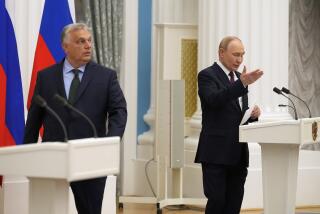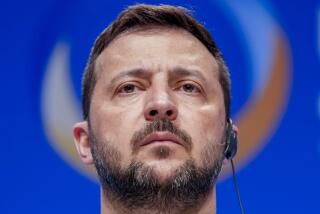France Gives Yeltsin Welcome Fit for Czar : State visit: Paris embraces the Russian president, once viewed in official circles as a demagogic boor.
- Share via
PARIS — Snubbed the last time like a gate-crasher at a state banquet, Russian President Boris N. Yeltsin on Wednesday began a protocol-packed visit to France to try to win assistance for Russia’s moribund economy and a firm commitment to nuclear disarmament.
With unabashed ostentation, the French went all-out to display their new esteem for the head of Europe’s biggest, most powerful country, who, until the collapse of Soviet power, was mostly viewed in Paris salons and official circles as a demagogic boor endangering the rule of former Soviet President Mikhail S. Gorbachev.
But with the demise of the Soviet Union, Yeltsin became the first leader of a sovereign Russia invited to Paris since Czar Nicholas II came in 1896 to cement what had been a key element of European stability--the Franco-Russian entente.
French President Francois Mitterrand traveled to Orly Airport south of Paris to greet his guest. A broad red carpet was spread on the pebble-strewn courtyard of Mitterrand’s official residence, the Elysee Palace, in time for Yeltsin’s arrival in his Zil limousine.
Yeltsin, who wound up a trip to Britain, America and Canada only last Sunday, made a point of thanking Mitterrand for his support during “perhaps the tensest period in our history since the Second World War.”
The message, at least in public, was that any slights of the past had been forgotten.
After a first round of talks with the French Socialist leader that lasted more than an hour, a cheerful Yeltsin, leaning on the open door of his departing Zil, expressed the hope that his three-day visit would yield “very concrete results, in the first place on nuclear weapons.”
Before leaving Moscow, he told journalists that he expected the Franco-Russian negotiations to result in cuts in France’s nuclear arsenal, and that “in any case, they (the French) will slow the tempo of development of such weapons. I am convinced of that.”
The talking points raised by the two countries are complex, with the French worried in particular about the fate of the 27,000 or so nuclear warheads that were in the hands of the Soviet military but are now the property of Russia, Ukraine, Kazakhstan and Belarus. Mitterrand has voiced alarm over the possibility of weapons of mass destruction “wandering about the landscape” of the former Soviet Union and the Kremlin’s nuclear brain trust being hired away by some Third World nations able to pay more money.
Yeltsin, for his part, has suggested that the United States and Russia enact a self-imposed cap of 2,500 warheads each and that the second tier of world nuclear powers--France, Britain and China--also trim their arsenals. Until now, the French position has been that the size of its own strike force is too small when compared with the arsenals of Russia and America to need reducing.
As Yeltsin, his wife, Anastasia (Naya), and other top government officials left Moscow for Paris, news reports in the Russian capital were warning that Russia could run out of basic foodstuffs such as beef and vegetable oil this month.
Yeltsin, who will sign a pioneering treaty with Mitterrand laying the legal groundwork for future relations between France and Russia, was also accompanied by a group of businessmen seeking to close deals with their French counterparts.
French officials say the chaos provoked by the collapse of the Soviet Union has left more than $740 million in credits allocated by France frozen, since Russian institutions were not authorized to claim them. In view of Russia’s pressing economic problems, aggravated at least in the short term by the abolition of government price supports for consumer goods, Yeltsin is expected to lay claim to the lion’s share of credits intended for the former Soviet Union.
In his closed-door talks with Mitterrand, French television reported, Yeltsin said the economic situation would become critical this month and in March, and asked for French help. Russian officials said Yeltsin is counting in particular on French cooperation in the field of management training.
Mitterrand previously had aligned French policy toward Moscow on the person and program of Gorbachev. Yeltsin received a distant welcome on his last visit, in April, 1991, when he was not yet elected president of Russia but was chairman of its legislature. Mitterrand then deigned to meet with Yeltsin for only five minutes; during his visit to the European Parliament in Strasbourg, one French deputy told the Russian leader to leave the room if he couldn’t tolerate criticism.
To erase such snubs, the Russian government reportedly demanded that the French this time around give Yeltsin the highest-ranking welcome possible.
And the French did pull out all the stops.
In the United States last Saturday, Yeltsin received a casual, country-style, man-to-man kind of welcome from President Bush. Bush drove Yeltsin in his golf cart, hosted the Russian leader for an informal lunch and presented him with a birthday cake and a pair of cowboy boots.
In France on Wednesday, Yeltsin was welcomed, as one newspaper reported, “like a czar.”
Yeltsin and his wife, a shy former Soviet engineer seldom seen in public back home, were escorted by Mitterrand in a limousine through the streets of Paris by the mounted unit of the elite Garde Republicaine --preceded by 20 horsemen blowing trumpets. The grand boulevards of the capital were festooned with the flags of France and the former czarist red-white-and-blue tricolor that serves again as the Russian flag.
The Yeltsins were housed in one of the ornate apartments of King Louis XIV at the Versailles Palace.
In the first of several elaborate meals planned for the trip, they were the honored guests Wednesday night at a dinner for 180 at the Grand Trianon ballroom of Versailles Palace. The meal featured goose liver from Landes, Pyrenees mountain lamb with asparagus tips and raspberries--the likes of which the shoppers of Moscow will never see.
Besides making up for any previous chill Yeltsin may have felt when visiting here, the regal splash for the Russian leader also provided a way for Mitterrand to divert public attention from his own political troubles.
With his canny sense of political timing, for example, Mitterrand will join Yeltsin in a news conference at the Elysee Palace at a time when his Socialist Party government is facing a vote of confidence in the French Parliament.
More to Read
Sign up for Essential California
The most important California stories and recommendations in your inbox every morning.
You may occasionally receive promotional content from the Los Angeles Times.













